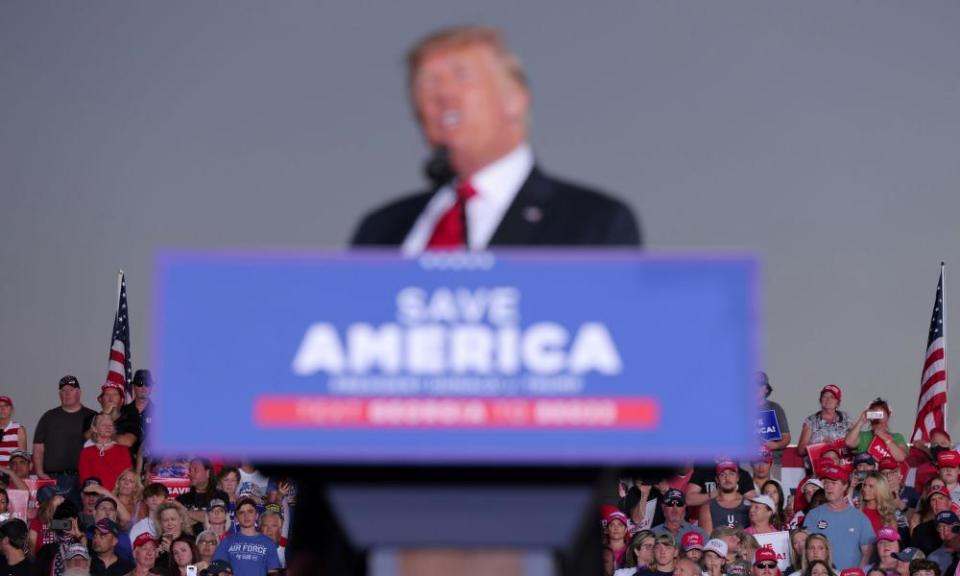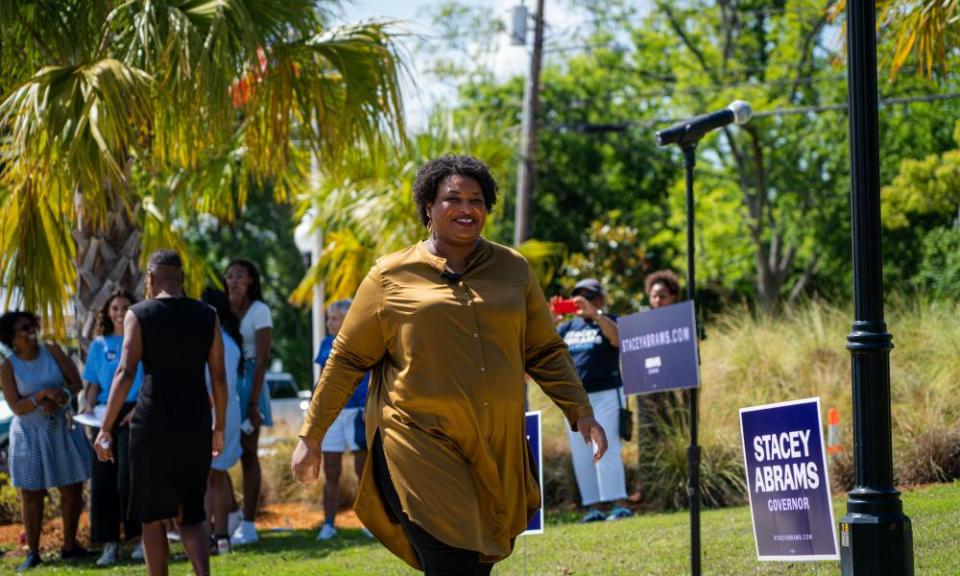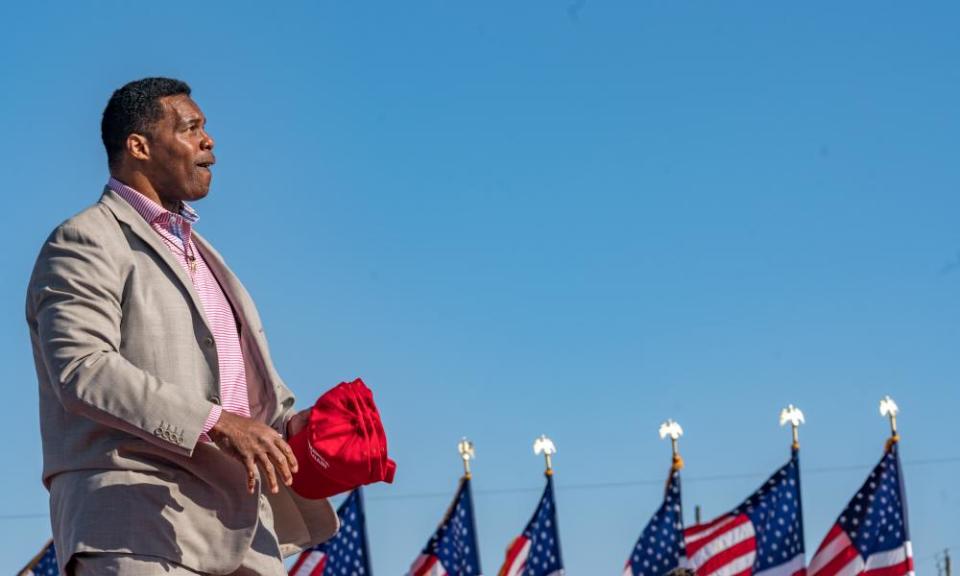Move over, Florida: Georgia the new battleground as Trump goes all in

Greg Bump will not vote for Governor Brian Kemp because “he sold us out in the election”. Todd Allinger is backing Kemp because “what he’s done for the state of Georgia has been really positive”. Teresa Richmond likes Kemp too but will “probably” vote for his rival, David Perdue, because of Donald Trump’s endorsement.
The views of Republican voters in Sugar Hill in the far northern Atlanta suburbs indicate that nothing can be taken for granted in Tuesday’s primary elections in Georgia, a state that has arguably eclipsed neighboring Florida as the most pivotal battleground in American politics.
Related: Georgia secretary of state primary will test big lie’s hold on Republicans
At first glance, the primaries are shaping up as another litmus test of Trump’s dominance of the Republican party. The former president has endorsed candidates up and down the ballot who hew to his “big lie” that the 2020 election was stolen. Opinion polls suggest that at least some of them will lose.
But the victors will not be moderates promising a repudiation of Trumpism. Their policies are generally aligned with his “America first” vision and far-right positions on abortion, transgender rights and the teaching of race in schools. The “Make America great again” (Maga) movement is endemic – even if Trump himself cannot entirely control it.
“What people don’t really realize is that the Trump Republicans have taken over the party,” said Marci McCarthy, who chairs the party in DeKalb county, which contains parts of Atlanta. “We saw something, we said something, we became motivated.”
Georgia has obsessed Trump since he narrowly lost it to Joe Biden in 2020. He pressured Georgia’s secretary of state, Brad Raffensperger, to find 11,780 votes to reverse the result and, having sown distrust in the electoral system, was then widely blamed for depressing Republican turnout in two Senate runoffs that gave Democrats control of the chamber.
Trump has since waged a personal vendetta against Kemp and Raffensperger for failing to subvert democracy in his favor. He is backing primary challengers David Perdue and Jody Hice, both content to amplify his false claims of voter fraud in their bids to become governor and secretary of state. Some Republicans here remain convinced that the issue is still potent.
McCarthy said: “It is truly incredibly important to have President Trump’s endorsement in our governor’s race. We have become somewhat of a divided party over the last two years since the 2020 election because there are people that don’t want to believe what happened.
“I believe that there were significant irregularities and deviations from our election code and through the absentee ballots. They overran the system and overwhelmed it and there were massive irregularities and fraud.”
Trump promoted such baseless allegations during a rally for Perdue in March. Kemp looks poised to fend off the challenge with help from the National Rifle Association, Republican Governors Association, Georgia Chamber of Commerce and, most intriguingly, Trump’s former vice-president, Mike Pence.
Like other incumbent governors, Kemp neutralised the Trump-backed threat by burnishing his own rightwing credentials. He signed a bill that would ban abortions six weeks after conception, imposed fresh voter restrictions and backed a law allowing Georgians to carry guns in public without a license or background check.
Andra Gillespie, an associate professor of political science at Emory University in Atlanta, said: “From an ideological standpoint, except for certifying the results of the 2020 election, he’s pretty much a by-the-book standard issue conservative Republican.”
“He’s got a big infrastructure that he’s been able to mobilise and he’s got decades of relationships that he built as a state legislator, as secretary of state and now as governor. Those don’t all go away because Donald Trump is upset. So Trump miscalculated here. It just doesn’t make sense barring a major scandal or weakness to go after an incumbent.”
Kemp’s rival, Perdue, was regarded as a business-oriented conservative during his six years in the US Senate, which came to an end with the runoff defeat by Jon Ossoff in January 2021. His calculated transformation into a Maga tribune – “The election in 2020 was rigged and stolen,” he insisted in a recent debate – has dismayed old Senate colleagues. Opinion polls suggest that his moral sacrifice is for nothing.
Erick Erickson, a conservative radio host in Atlanta who has interviewed most candidates in the primaries, said: “Kemp’s going to run away with it. Perdue never should have gotten into the race. It’s really hard to run a race for governor against the guy who, the month before, you were saying you supported.”
The winner of the Republican primary is set to face Stacey Abrams, who is unopposed for the Democratic nomination, in November. Abrams is pro-democracy activist who pushed Kemp close four years ago in her attempt to become the country’s first female African American governor.
Erickson added: “Kemp’s message is: I beat her once, I can beat her again. Perdue couldn’t even beat Jon Ossoff.”
Kemp must poll above 50% to win the primary outright and avoid a runoff next month. He faces four rivals: Perdue, Kandiss Taylor, Catherine Davis and Tom Williams. Taylor, who admits she was “a little disappointed” not to receive Trump’s endorsement, has been trying to outflank Perdue on Maga themes such as “Jesus, guns and babies” and, of course, voter fraud.
Taylor says she has clocked up 90,000 miles on the campaign trail and denies that voters are eager to move on from the 2020 election. “When you commit murder, if it’s been 20 years later, you get the death penalty in Georgia,” she said. “So, yes, you commit treason, you get held accountable for that. I don’t care if it’s been a year and a half or two years.”

Taylor, 41, from Baxley in southern Georgia, has spent most of her career as a school counsellor. She claims that another key voter concern is education, specifically “a liberal agenda being pushed into our school system and sexualising our children”.
Georgia, once linchpin of the slave-owning Confederacy, has long been a crucible of America’s racial tensions. Towering outside the state capitol in Atlanta is a statue of Richard Russell, a US senator who voted against the 1964 Civil Rights Act, filibustered anti-lynching bills and co-wrote the “Southern Manifesto” to slow the racial integration of public schools.
Inside the ornate building the walls are lined with portrait after portrait of state governors, all of them white men, one with what appears to be a Confederate flag hanging above his shoulder. There is a bust of Alexander Stephens, vice-president of the Confederate states and later governor of Georgia, and a portrait of the Confederate general Robert E Lee.
Nearby is the wood-paneled governor’s office. On a recent Tuesday, when the Guardian entered, a big TV was tuned to Fox News and a commercial break in which the election conspiracy theorist Mike Lindell was promoting his company MyPillow. Kemp himself was not present and proved unavailable for interview.
A portrait of Atlanta-born Martin Luther King, meanwhile, is tucked away in a corner of the state capitol. An information panel notes that, during most of his lifetime, the capitol was racially segregated and it is uncertain whether he ever entered the building.
Last year, Raphael Warnock, pastor of the church where King preached, made history as Georgia’s first Black senator, a symbolic stride towards “the new south”. But he is up for re-election in November and likely to face another African American man, Herschel Walker, a former football star, political novice and signifier of the weight of celebrity in modern politics.
Walker, 60, gained folk hero status in the state after leading the University of Georgia to the national championship in 1980 (a triumph they did not repeat until this year). Four years later, Trump bought a professional team that wooed Walker away from Georgia. Walker wrote in his memoir: “Mr Trump became a mentor to me and I modeled myself and my business practices after him.”
Trump has endorsed Walker’s Senate campaign but, such is the candidate’s local fame, he would probably win the Republican nomination anyway. Voters seem unconcerned by his refusal to debate opponents, bizarre statements (“At one time, science said man came from apes. Did it not? Well, this is what’s interesting, though. If that is true, why are there still apes? Think about it”) and troubled past.

A recent Washington Post profile of Walker told how in the early 1990s, “as he explained to Howard Stern in an interview in 2010, he started playing Russian roulette, seated in the kitchen of his suburban Dallas home, loading a solitary bullet in a .38-caliber Smith & Wesson, spinning the chamber, placing the gun to his temple and pulling the trigger.
“He did this more than half a dozen times over the next decade, he said, not because he was suicidal but simply for the thrill of competition, a claim that shocked even Stern. ‘At no point do you say to yourself, “I love living”? “I love life”?’ Stern asked him.
“‘No, I don’t think I ever realized that,’ Walker said. ‘I just love to compete. And I thought that was the ultimate game of competition.’”
Among other red flags, Walker’s ex-wife secured a protective order against him in 2005 and cited “physically abusive and extremely threatening behavior” in her filing for divorce.
But Shelley Wynter, a radio host in Atlanta who recently interviewed Walker in front of an audience, said these stories were unlikely to hurt the candidate because he was upfront about them in a memoir and because political attempts to exploit mental health could backfire.
“The Democrats have to dance a fine line around that because what you’re essentially saying is that every single person, particularly Black men, who have sought help for mental health, you can’t be hired, you shouldn’t be brought into a company,” he said.
“The Democrats – and the Republicans – are hard pressed to make that an attack. It becomes the voters’ decision. Does a voter feel comfortable voting for someone who’s had these past problems? That’s a fair question on the voter’s part but I don’t think it’s a wise attack if you’re running against him.”
Walker’s cheerleaders include Newt Gingrich, a former House speaker who spent part of his childhood in Georgia and has been campaigning on Perdue’s behalf. He said: “Herschel’s extraordinarily important to the future of the country.
“Having an achievement-oriented, very competitive African American Republican senator working with Tim Scott [a Black senator from South Carolina] will be an enormous asset and I think he’ll shake up the Senate.”
Gingrich is not troubled by Walker’s outsider status. “If you would like to have a non-politician, having somebody who doesn’t know much about politics may be an advantage.”
Republicans are absolutely motivated in this election, more than I’ve ever seen
Jay Williams
Come November, Georgia may be at the mercy of national trends. The party that holds the White House tends to lose seats in midterm elections. Abrams and Warnock will also have to grapple with voter suppression as well as concerns over inflation, crime and the southern border that have caused Biden’s poll rating to plummet.
Jay Williams, a Republican strategist in the state, said: “You’re going to see Republicans come out in droves. Republicans are absolutely motivated in this election, more than I’ve ever seen, and the polling shows that. It’s going be very difficult for a Democrat to make the case that, after leading the country for two years in the House, Senate and presidency, they’re doing a good job.”
Whether the Republican nominee for governor, senator and other positions at stake in Georgia on Tuesday is mild-Maga, middle-Maga or ultra-Maga might not make much difference. From Idaho to Nebraska to North Carolina, voters have already shown their willingness to separate Trump from Trumpism when pragmatism demands.
Williams added: “By and large, Republicans support what Trump did as president. They support some of the things that he’s doing now. They can differentiate between Trump being Trump and voting for who they want in Georgia.
“Republicans are not this collective group where it’s like we do it all as a group together. We are pretty independent. We make our own decisions. as much as everybody says we’re Trump’s party. These people on a national level may support Trump but on a local level they may want their guy. They can see them coexisting together.”
Back in Sugar Hill, Kyle Renuart, 51, a business development manager carrying groceries from a supermarket to his car, was a case in point. “We’re definitely Trump supporters but right now the best one to go against Stacey Abrams would be Kemp because he’s already beaten her,” he said. “We’re definitely leaning towards the Kemp campaign because we know we’re not a big fan of Stacey Abrams.”

 money
money 